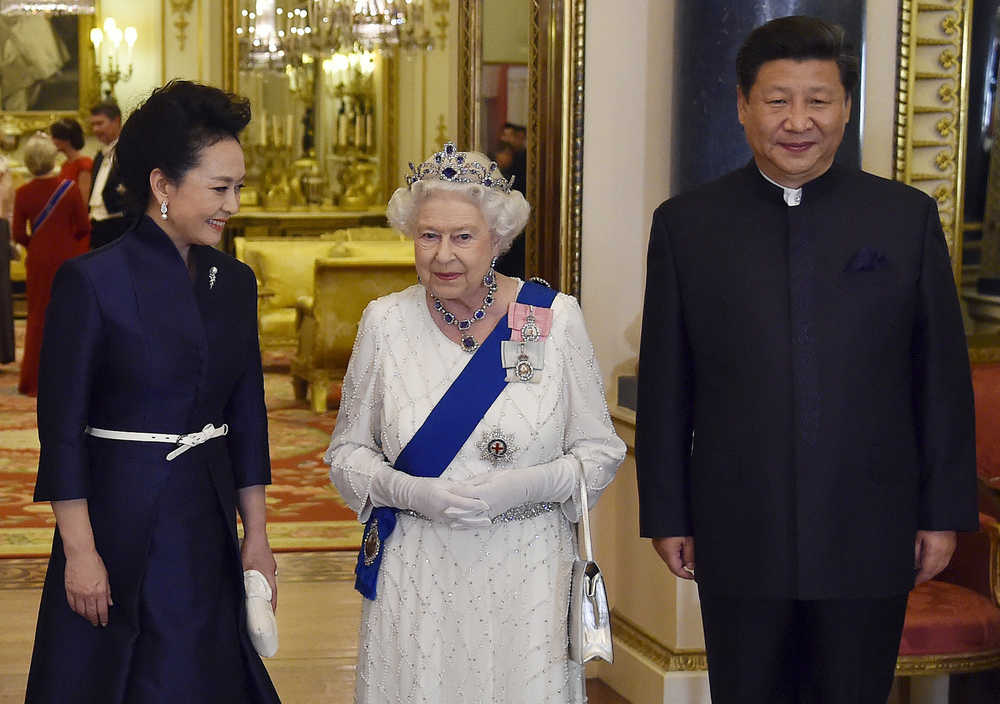LONDON — China’s leader quoted Chinese proverbs and William Shakespeare while Britain’s prime minister hailed a “golden age” between the two nations as a state visit festooned with regal pomp and pageantry was shadowed by concerns about national security, human rights and economic rivalry.
President Xi Jinping’s trip, years in the making, aimed to cement deals giving Britain a vast new pool of investment and China greater access to European markets. But as Xi was welcomed Tuesday as an honored guest at Buckingham Palace and Parliament, critics warned that Britain was taking a risk by courting Beijing so aggressively.
“If you act like a panting puppy, the object of your attention is going to think they have got you on a leash,” James McGregor, a China expert at consulting firm APCO, told the BBC.
Some British politicians, businesspeople and union members are alarmed by growing Chinese investment in key sectors of the British economy, including nuclear power, and by Chinese competition in areas such as steel production.
Hundreds of U.K. steel layoffs were announced Tuesday, the first full day of Xi’s four-day visit, in a crisis that manufacturers blame on China selling steel at a loss on world markets to secure its own market share.
Prime Minister David Cameron is under pressure to confront Xi about the steel industry and human rights, but China’s leader was welcomed to London with lavish tradition and military pomp — a genre at which both Britain and China excel.
Xi was greeted with a 41-gun artillery salute before being driven to Buckingham Palace, where he and his wife Peng Liyuan will stay, in a gilded carriage drawn by white horses.
Britain and China have a long and sometimes antagonistic history that includes the 19th-century Opium Wars and decades of Cold War tension. But Xi quoted Shakespeare — “What’s past is prologue” — and urged the two nations to “join hands and move forward” toward peace and development, during a short speech to both houses of Parliament.
Britain’s Conservative-led government has been courting China, the world’s second-largest economy, for years. When Xi’s predecessor, Hu Jintao, paid a state visit to Britain in 2005, the countries announced $1.3 billion in trade deals. This time, Britain said the two nations would sign $46 billion in business agreements.
Treasury chief George Osborne, a champion of closer ties, has said he wants China to be Britain’s biggest trading partner after the United States by 2025.
Yet economic rivalries remain. Tata Steel announced 1,200 layoffs at its British plants Tuesday, just weeks after 2,200 jobs were lost at SSI’s plant in northeast England. Tata said the layoffs were in response to “a shift in market conditions caused by a flood of cheap imports, particularly from China, a strong pound and high electricity costs.”
Labour Party business spokesman Kevin Brennan accused the government of being “content to allow Britain’s entire steel-making capacity to disappear in the face of blatant Chinese dumping.”
China also is set to build a new nuclear power plant in southwest England, and the two governments have signed deals giving Chinese money greater access to London’s financial district.
The slew of deals has sparked accusations that Britain is pandering to China to secure investment. Opposition politicians are urging Cameron to raise China’s human rights record in his several meetings with Xi this week.
Others caution against relying too heavily on a country whose astonishing recent economic growth is flagging. Data released Tuesday showed China eased to a six-year low of 6.9 percent growth in the third quarter after expanding 7 percent in each of the previous two quarters. Some economists, however, say this year’s true rate of growth for China might be as low as 4 percent.
Andreas Fulda, a lecturer in Chinese studies at the University of Nottingham, said the British government was being overly optimistic about the economic impact of Chinese trade. He said it appeared illogical for Britain to open up its economy to China without reciprocal measures to allow European businesses into the Chinese market.
“The Chinese market is not a level playing field,” he said.
On Tuesday evening, Queen Elizabeth II was hosting a state banquet for Xi at Buckingham Palace, attended by senior politicians and royalty — but not by heir to the throne Prince Charles, a friend of exiled Tibetan spiritual leader the Dalai Lama.
The palace did not give a reason for Charles’ absence. He held several engagements with Xi earlier in the day, including a private meeting over tea.
__
Associated Press Writers Danica Kirka and Sylvia Hui in London and Joe McDonald in Beijing contributed to this report.

